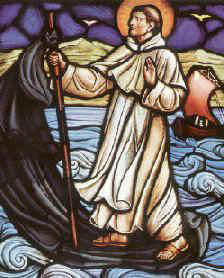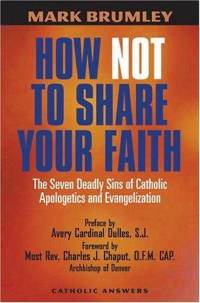|
To work for the proper implementation of canon law is to play an extraordinarily constructive role in continuing the redemptive mission of Christ. Pope John Paul II |
|
|
|
|
Resolution 1152 x 864 |
Updated 3 jan 2013 |
Review of Mark Brumley, How Not to Share your Faith (Ignatius, 2003) 124 pp. |
|
Edward Peters, Review of M. Brumley, How Not to Share Your Faith (2003), in Homiletic & Pastoral Review (Aug-Sep 2003) 82-84.
|
To time-bound mortals, the Holy Spirit’s “sense of timing” often seems askew. One can imagine, for example, a Roman patriot’s utter dismay as he watched, with western civilization crashing in flames around him, as its best and the brightest citizens followed the Holy Spirit into the desert just when, to the patriot’s eyes, the Empire most needed their help. Or again, no sooner was the Church wrenched of half its resources by the Protestant revolution, than did the Holy Spirit calmly present it with not one, but two, vast trans-oceanic continents to evangelize.
It is with something of the same “is this really happening now” puzzlement that one sees today, concomitant with the grossest clergy scandals since, well, probably ever, and in a period when the Church’s message is more likely than ever to met with modernist derision, nothing less than the greatest flowering of Catholic apologetics in a century, and of lay Catholic apologetics, in a millennium, if not two.
But try telling, to tap just the top of the iceberg, Karl Keating or James Akin, Peter Kreeft or Fr. Mitchell Pacwa that this is not exactly the best time to be so front and center with the Gospel message, or that now is rather the time for strategic compromises with secular powers, or that our efforts should concentrate on not losing more creditability while we try to regroup for the future. Go ahead. I dare you.
Modern Catholic apologetics (one could almost say American Catholic apologetics, since it is almost a uniquely American phenomenon at present) has two characteristics that, second only to the remarkableness of the Holy Spirit’s calling it forth at such an “inopportune” time, bear careful noting: first, it is almost entirely a lay movement; second, it is much, much larger than most people realize. There are in fact besides the dozen or so well know names, hundreds of Americans who devote a significant amount of their time to Catholic apologetics, and some thousands more who follow it closely, awaiting but a nudge to enter the field themselves. And it has all happened with no episcopal leadership, indeed, with virtually no episcopal presence until very recently.
The apologetics movement has so far concentrated on the urgent task of producing substantive answers to modern doctrinal questions and objections. Mark Brumley has certainly added his share of materials to this corpus. But now Brumley has produced what I think is the apologetics movement’s first self-study and, not to put too a fine a point on it, I don’t think anyone in America was better qualified to do it.
Mark Brumley is a married layman with five children. He personally experienced and grappled with a host of apologetical issues as he wound his way through various Protestant denominations on his way to the Catholic Church. He has been a Catholic for more than twenty years, so no neophyte he.
Brumley worked several years for the oldest and largest apologetics apostolate in the America, Keating’s San Diego-based Catholic Answers, Inc. He wrote, debated, lectured, and advised on a wide range of apologetical issues, all the while applying his prodigious capacity to learn to the great questions facing modern seekers of religious truth. He gained additional insights by serving in a large metropolitan chancery, and along the way lifted an ordinary diocesan newspaper from somnambulence to being recognized as the best in America. During those same years, and at significant personal sacrifice, he earned a masters degree in theological studies from the University of Dallas and later served as adjunct professor for apologetics for the Institute for Pastoral Theology.
At Ignatius Press for the last eight years, he is pulling together, among other things, a series of apologetics books that to date includes such notable works as Stephen Ray’s defense of the papacy, Upon This Rock, and Carl Olson’s critique of the Rapture and Protestant Dispensationalism, Will Catholics be Left Behind?. Amid these plentiful duties and more, he is editing the Ignatius Press Encyclopedia of Apologetics and Evangelization which, when it is released, will be the indispensable resource for which thousands of rank and file apologists have been longing. There is, in no brief, almost no one in apologetics whom Brumley does not know, practically no aspect of apologetics unfamiliar to him, and virtually no issue in the field that he has not studied. And all of this erudition and experience is brought to bear a remarkably compact 124-page book released by Catholic Answers, Inc.
Despite his unequaled resume, Brumley’s treatise on apologetics and evangelization is hardly a list of Thou Shalts; he is too wise, and too humble, to try to tell a thousand apologists, themselves facing ten-thousand issues, how specifically to go about their task. Rather, Brumley chose to narrate seven pitfalls in the path of apologetics, obstacles to effectiveness that, in his words, “I have seen and continue to see all too clearly in my own life.”
No more than did Avery Cardinal Dulles in his incisive Preface will I try “to summarize the contents of this brief, lively, and eminently readable book.” Suffice to say, with Cardinal Dulles, that the seven deadly sins Brumley underscores are not imaginary, but instead are real vocational hazards that are almost inseparable from the calling of all apologists. Few there are, I think, who will fail to see themselves reflected in Brumley’s gentle warnings about, say, apologetical gluttony (Chap. 1) or winning for the sake of winning (chap. 6). With Brumley’s help, each apologist can avoid the danger of confusing the faith with our arguments for it (Chap. 3), or levying (or responding too harshly to) friendly fire between ourselves (Chap. 5). Nor does Brumley content himself, as he could have, with simply pointing out pitfalls to apologetics, for in two insightful chapters (nos. 9 and 10) he offers concrete advice on how to address these tendencies among apologists, and suggests nothing less than seven healthy habits conducive to and worthy of genuine apologists, men and women shouldering a task that is truly more important now than ever.
|





